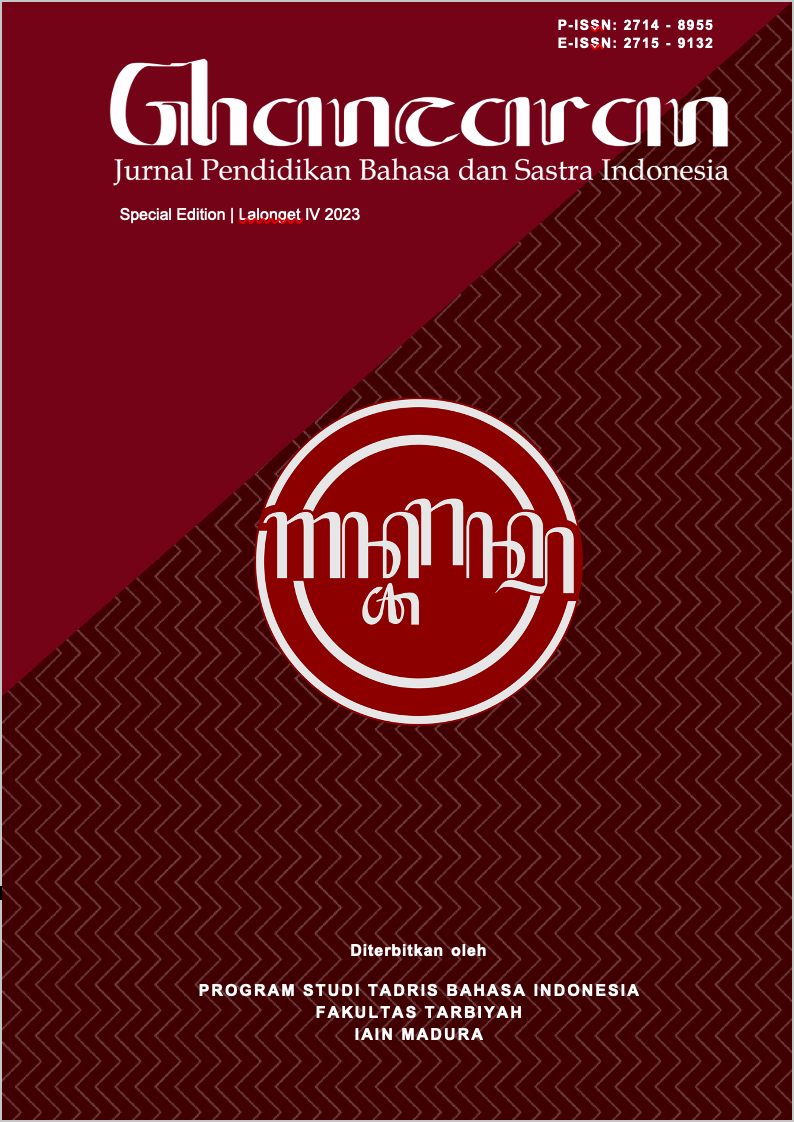Implementasi E-Modul Berbasis Exe Learning pada Materi Puisi untuk Siswa Kelas VII MTs Sunan Kalijaga
 Abstract views: 237
,
Abstract views: 237
,
 PDF downloads: 289
PDF downloads: 289
Abstract
Learning media is a process that must exist to develop learning models in the independent curriculum, it is known that in class VII MTs Sunan Kalijaga, the learning media used are quite diverse, but the information technology facilities provided are not utilized properly, so teachers continue to make efforts to be able to utilize information technology in an appropriate manner. One of the Indonesian language teachers' efforts is to implement e-modules based on Exe Learning, so the aim of this research is to be able to describe how to implement the use of e-modules based on Exe Learning on poetry material as well as the advantages and disadvantages of this learning media when implemented. This research model uses descriptive qualitative methods. The results of this research show that this Exe Learning based e-module is considered very effective because the use of this Exe Learning based e-module has several benefits for students and teachers and can increase students' interest, creativity and learning motivation as well as improve student learning outcomes when carried out. test on poetry material. However, this application has several shortcomings which must also be developed further, namely that it must be used on a PC or laptop, making it difficult to access by students who do not have laptops/PCs outside of school
Downloads
References
Astut, D. (2013). PEMBELAJARAN TEKS ULASAN BERDASARKAN KURIKULUM 2013 PADA SISWA KELAS VIII SMPN 2 PONTIANAK. Jurnal Pendidikan Dan Pembelajaran Khatulistiwa, 4(1).
Azizah, S., Khuzaemah, E., & Lesmanawati, I. R. (2017). Penggunaan Media Internet eXe-Learning Berbasis Masalah pada Materi Perubahan Lingkungan untuk Meningkatkan Hasil Belajar Siswa. Scientiae Educatia: Jurnal Pendidikan Sains, 6(2). https://doi.org/10.24235/sc.educatia.v6i1.1957
Irwan, I., Ichsan, F. N., Gistituati, N., & Marsidin, S. (2021). Analisis Kebijakan Pendidikan Terkait Implementasi Pembelajaran Pada Masa Darurat Covid 19. Jurnal Manajemen Pendidikan, 9(2), 89–95. https://doi.org/10.33751/jmp.v9i2.4238
Jahro, I. S., & Ridho, D. (2015). Penerapan Model Problem Based Leaning Menggunakan Media Exe Learning untuk Meningkatkan Hasil Belajar dan Kerjasama Siswa Pada Materi Hidrokarbon. Jurnal Pendidikan Kimia, 7(3).
Kusuma, A., Pratama, R., & Sari, D. K. (2020). The Implementation of Exe Learning-Based E-Module on Physics Learning for High School Students. Journal of Physics: Conference Series, 1521(3), 32–41.
Priyambodo, E. (2010). Pemanfaatan Program Aplikasi Exe (Elearning XHTML Editor) dalam Penyusunan Media Pembelajaran di Sekolah. Prosiding Seminar Nasional Penelitian, Pendidikan Dan Penerapan MIPA.
Putra, Z. H., Witri, G., & Yulita, T. (2019). Development Of Powerpoint-Based Learning Media In Integrated Thematic Instruction Of Elementary School. International Journal Of Scientific & Technology Research, 8(10), 697–702.
Putri, R. S., Darmansyah, & Desyandri. (2022). Implementasi Media Pembelajaran Berdifirensiasi Berbasis TIK pada Kurikulum Merdeka Belajar di SD. Jurnal Ika:Ikatan Alumni Pgsd Unars, 12(2), 167–176. https://unars.ac.id/ojs/index.php/pgsdunars/index
Rohmadi, M. (2021). Pemanfaatan eXe Learning Sebagai Media Belajar Dari Rumah Selama Pandemi Covid-19. Educatio: Jurnal Ilmu Kependidikan, 16(1), 37–49. https://doi.org/10.29408/edc.v16i1.3343
Septikasari, R. (2020). Keterampilan 4c Abad 21 dalam Pembelajaran Pendidikan Dasar. Journal of the American College of Cardiology, 75(20). https://doi.org/10.1016/j.jacc.2020.04.015
Sofyan, P. (2015). Pandungaan eXe-Learning Sebagai Aplikasi Pembuatan Modul e-Learning. In Pusdiklat Kehutanan.
Sudjana, N. (2005). Metode Statistika. Tarsito.
Sugiyarti, L., Arif, A., & Mursalin. (2018). Pembelajaran Abad 21 di SD. Prosiding Seminar Dan Diskusi Nasional Pendidikan Dasar, 439–444.
Sukmadinata, & Syaodih, N. (2008). Metode Penelitian Pendidikan. PT Remaja Rosdakarya.
Ulfah, A., Fitriyah, L., Zumaisaroh, N., & Jesica, E. (2023). Pemanfaatan Media Pembelajaran Digital dalam Pembelajaran Menulis Puisi di Era Merdeka Belajar. Ghâncaran: Jurnal Pendidikan Bahasa dan Sastra Indonesia, 5(1), 42–57. https://doi.org/10.19105/ghancaran.v5i1.7914
Wahyuni, S. (2014). Pengembangan Interactive E-Book Bidang Asesmen Bahasa Untuk Mengembangkan Kompetensi dan Kemandirian Mahasiswa Program Pendidikan Bahasa. Jurnal Litera, 13(1), 128–139. https://doi.org/10.21831/ltr.v13i1.1908
Werdiningsih, D. (2023). Literasi Sains dan Materi Pembelajaran Bahasa Indonesia (Cetakan II). CV. Literasi Nusantara Abadi.
Copyright (c) 2023 GHANCARAN: Jurnal Pendidikan Bahasa dan Sastra Indonesia

This work is licensed under a Creative Commons Attribution-ShareAlike 4.0 International License.
Ghancaran: Jurnal Pendidikan Bahasa dan Sastra Indonesia uses an Open Access Policy under the Creative Commons Attribution-ShareAlike 4.0 International License. Authors publishing in this journal agree to the following terms:
- Ghancaran Journal holds the copyright and grants the journal rights for first publication with the work simultaneously licensed under a

The work is distributed under Creative Commons Attribution-ShareAlike 4.0 International License which allows others to share, copy, and redistribute the material in any media or format and adapt, remix, change, and develop the material even for commercial purposes, as long as it is stated credit and license derivative works under similar terms. - Authors may make additional contractual arrangements for non-exclusive distribution of the journal's published work version.
- Authors are permitted to post their work online (e.g., in institutional repositories or on their websites) before and during submission, as doing so may lead to productive exchange.



















